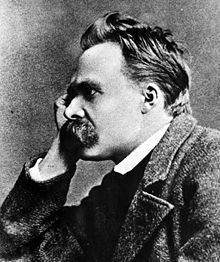
Nietzschean Zionism was a movement arising from the influence that the German philosopher Friedrich Nietzsche had on Zionism and several of its influential thinkers.[1] Zionism was the movement for the attainment of freedom for the Jewish people through the establishment of a Jewish state.[2] Friedrich Nietzsche's philosophy was popular among Jewish intellectuals, and therefore incorporated into Zionism relatively effortlessly.[3]
Friedrich Nietzsche's influence was expressed itself by a desire to move away from the Jewish past into an empowering future for the Hebraic New Man, the adoption of his ideas necessitating the Jews to surpass the antiquarian Jewish identity that had a rabbinical consciousness at its center.[1] The philosopher's influence on the Zionists can then be thought of as an existential revolution–that is, it focused on the renewal of the Jewish identity, the adoption of aesthetic values, and enhancing the will for life.[4] The Zionist revolution emphasized that “the new Jews," the concept of which was similar to Nietzsche's “new European man,” should choose to go to Zion or stay in Europe.[3] Theodor Herzl, “the author and the vision of the Jewish State,” viewed Zionism as the arrival of an authentic image of the Jew in a state without the idea of God or any dogmatization,[3] exhibiting a very similar format to that of Nietzsche's libertarianism or anti-dogmatism.[3]
- ^ a b Aschheim, Steven E. (1992). The Nietzsche Legacy in Germany 1890-1990. University of California Press. p. 102. ISBN 978-0-520-07805-5.
- ^ Katz, Steven T. (1992). Historicism, the Holocaust, and Zionism. NYU Press. pp. 289–299.
- ^ a b c d Cite error: The named reference
:2was invoked but never defined (see the help page). - ^ Golomb, Jacob (2004). Nietzsche and Zion. Cornell University Press. pp. 46–64, 159–188.